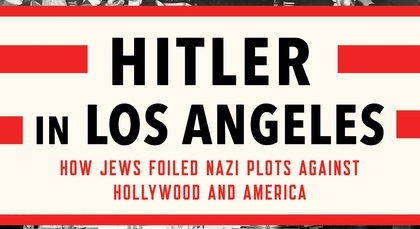
Hitler in Los Angeles: How Jews Foiled Nazi Plots Against Hollywood and America tells the incredibly true story of Jews fighting back against Nazis in LA.
Leon Lewis and Joseph Roos are American heroes. You might not know their names and that’s perfectly okay. Truthfully, I didn’t know their names either. However, I’m perfectly glad to finally rectify this.
There were some pretty damning moments while reading this book. Given the state of the United States during this era, I’m honestly not surprised. I mean, FDR’s administration was weak when it came to remaining isolationist while Jews were getting attacked and sent to the gas chambers in Europe. Outside of Jews in America, who knew just how bad the atrocities were in Europe?
On the home front, J. Edgar Hoover and the FBI were more concerned with Communists. That’s right. The threats from Nazis and fascists didn’t even matter. The same also went for the Los Angeles Police Department. I mean, these were people threatening revolution and an overthrow of the government! You would be surprised how many Nazi sympathizers and KKK members were working for the LAPD. In fact, the leader of the Red Squad supported the Nazis! At least, this is how the book implies. If this doesn’t scare you, you’re in for a rude awakening!
Locally, Hollywood studio moguls did come to the rescue in terms of financing the spy ring. Because of the Production Code rules and German consul Georg Gyssling, the studios weren’t in a position to fight Nazis through the big screen. Though when the time finally arrived, Confessions of a Nazi Spy was the first major release. Warner Brothers wasn’t playing around! It really came down to the bottom line. Was it worth sacrificing the German box office? This depends on who you talk to. Over at MGM, money did matter–but Mayer didn’t act in the way that Urwand implies (per reports). Whereas at Warners, they wouldn’t go down without a fight.
During this era, many organizations were popping up left and right. Leon Lewis and Joseph Roos placed their spies into as many as possible. Upon hearing of a potential threat, they immediately notified the proper authorities. Some authorities acted on the threats while others didn’t do so. You never know who sympathized with who. Reporting to the LAPD could certainly be a lost cause depending on who received the information. And yet it was this spy ring that had all the information when the authorities wanted something. By the end of 1940, they were established as “an unofficial branch of American intelligence, sending regular reports to naval intelligence, the FBI, the War Department, and the State Department.”
One such organization popping up was America First. They may have been branded as an American organization. However, it was just another Nazi front–even if it wasn’t mentioned in public. As the leading isolationist organization of the day, it isn’t surprising that there were 800,000 dues paying members at its peak. Sadly, its membership included two future presidents: John F. Kennedy and Gerald Ford.
At some point before Pearl Harbor, Hoover ordered foreign agents operating without his permission to be expelled. This even included some British spies. Before they left, they did give their list of agents to Roos. Thank G-d. In turn, the list would be handed over to the FBI.
To put things in simple terms, it took the work of a Jewish spy ring in Hollywood to get Congress and intelligence agencies to actually care. And when Congress finally took action by starting up the House Un-American Activities Committee, Congressman Samuel Dickstein decided against taking the chairmanship. Because of this, HUAC didn’t really focus on the growing Nazi threat.
“HUAC had emerged out of Samuel Dickstein’s burning desire to halt the growth of Nazism in the United States. But his strategy of legitimizing the investigation by turning the chairmanship over to a non-Jew had backfired. [John] McCormack saw Russia, not Germany, as posing the greatest threat to American security.”
Roos really says the money quote: “It was really sad to see how poor our own intelligence operation was.” Ross writes: “Two Jews working in a small office had gathered more information about Nazis than the entire Los Angeles bureau.”
This book really needs to be adapted into a feature film. The content here is exactly what period thrillers are made for. Steven J. Ross organizes the book neatly into chapters that work together as a theme. And yet, it’s a little known story but shows that Jews were kicking ass long before the government took any action.



